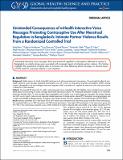Files in this item
Unintended consequences of mHealth interactive voice messages promoting contraceptive use after menstrual regulation in Bangladesh : intimate partner violence results from a randomized controlled trial
Item metadata
| dc.contributor.author | Reiss, Kate | |
| dc.contributor.author | Andersen, Kathryn | |
| dc.contributor.author | Pearson, Erin | |
| dc.contributor.author | Biswas, Kamal | |
| dc.contributor.author | Taleb, Fahmida | |
| dc.contributor.author | Ngo, Thoai D. | |
| dc.contributor.author | Hossain, Altaf | |
| dc.contributor.author | Barnard, Sharmani | |
| dc.contributor.author | Smith, Chris | |
| dc.contributor.author | Carpenter, James | |
| dc.contributor.author | Menzel, Jamie | |
| dc.contributor.author | Footman, Katharine | |
| dc.contributor.author | Keenan, Katherine | |
| dc.contributor.author | Douthwaite, Megan | |
| dc.contributor.author | Reena, Yasmin | |
| dc.contributor.author | Mahmood, Hassan Rushekh | |
| dc.contributor.author | Tabbassum, Tanzila | |
| dc.contributor.author | Colombini, Manuela | |
| dc.contributor.author | Bacchus, Loraine | |
| dc.contributor.author | Church, Kathryn | |
| dc.date.accessioned | 2019-10-11T16:30:07Z | |
| dc.date.available | 2019-10-11T16:30:07Z | |
| dc.date.issued | 2019-09-23 | |
| dc.identifier | 261745579 | |
| dc.identifier | bc3edbcb-52e0-4eb5-90ac-f23aa177beb4 | |
| dc.identifier | 85072704697 | |
| dc.identifier | 31558596 | |
| dc.identifier | 000504488700005 | |
| dc.identifier.citation | Reiss , K , Andersen , K , Pearson , E , Biswas , K , Taleb , F , Ngo , T D , Hossain , A , Barnard , S , Smith , C , Carpenter , J , Menzel , J , Footman , K , Keenan , K , Douthwaite , M , Reena , Y , Mahmood , H R , Tabbassum , T , Colombini , M , Bacchus , L & Church , K 2019 , ' Unintended consequences of mHealth interactive voice messages promoting contraceptive use after menstrual regulation in Bangladesh : intimate partner violence results from a randomized controlled trial ' , Global Health: Science and Practice , vol. 7 , no. 3 , pp. 386-403 . https://doi.org/10.9745/GHSP-D-19-00015 | en |
| dc.identifier.issn | 2169-575X | |
| dc.identifier.other | ORCID: /0000-0002-9670-1607/work/63046289 | |
| dc.identifier.uri | https://hdl.handle.net/10023/18649 | |
| dc.description | This study is funded by UK aid from the UK government. It was part-funded through the Strengthening Evidence for Programming on Unintended Pregnancy (STEP-UP) Research Consortium, managed by the Population Council. KR was funded by an ESRC PhD fellowship. | en |
| dc.description.abstract | Background: Mobile phones for health (mHealth) hold promise for delivering behavioral interventions. We evaluated the effect of automated interactive voice messages promoting contraceptive use with a focus on long-acting reversible contraceptives (LARCs) among women in Bangladesh who had undergone menstrual regulation (MR), a procedure to “regulate the menstrual cycle when menstruation is absent for a short duration.” Methods: We recruited MR clients from 41 public- and private-sector clinics immediately after MR. Eligibility criteria included having a personal mobile phone and consenting to receive messages about family planning by phone. We randomized participants remotely to an intervention group that received at least 11 voice messages about contraception over 4 months or to a control group (no messages). The primary outcome was LARC use at 4 months. Adverse events measured included experience of intimate partner violence (IPV). Researchers recruiting participants and 1 analyst were blinded to allocation groups. All analyses were intention to treat. The trial is registered with ClinicalTrials.gov (NCT02579785). Results: Between December 2015 and March 2016, 485 women were allocated to the intervention group and 484 to the control group. We completed follow-up on 389 intervention and 383 control participants. Forty-eight (12%) participants in the intervention group and 59 (15%) in the control group reported using a LARC method at 4 months (adjusted odds ratio [aOR] using multiple imputation=0.95; 95% confidence interval [CI]=0.49 to 1.83; P=.22). Reported physical IPV was higher in the intervention group: 42 (11%) intervention versus 25 (7%) control (aOR=1.97; 95% CI=1.12 to 3.46; P=.03) when measured using a closed question naming acts of violence. No violence was reported in response to an open question about effects of being in the study. Conclusions: The intervention did not increase LARC use but had an unintended consequence of increasing self-reported IPV. Researchers and health program designers should consider possible negative impacts when designing and evaluating mHealth and other reproductive health interventions. IPV must be measured using closed questions naming acts of violence. | |
| dc.format.extent | 18 | |
| dc.format.extent | 436315 | |
| dc.language.iso | eng | |
| dc.relation.ispartof | Global Health: Science and Practice | en |
| dc.subject | RA0421 Public health. Hygiene. Preventive Medicine | en |
| dc.subject | Health Policy | en |
| dc.subject | Public Health, Environmental and Occupational Health | en |
| dc.subject | NDAS | en |
| dc.subject | SDG 3 - Good Health and Well-being | en |
| dc.subject | SDG 16 - Peace, Justice and Strong Institutions | en |
| dc.subject.lcc | RA0421 | en |
| dc.title | Unintended consequences of mHealth interactive voice messages promoting contraceptive use after menstrual regulation in Bangladesh : intimate partner violence results from a randomized controlled trial | en |
| dc.type | Journal article | en |
| dc.contributor.institution | University of St Andrews. School of Geography & Sustainable Development | en |
| dc.identifier.doi | 10.9745/GHSP-D-19-00015 | |
| dc.description.status | Peer reviewed | en |
This item appears in the following Collection(s)
Items in the St Andrews Research Repository are protected by copyright, with all rights reserved, unless otherwise indicated.

